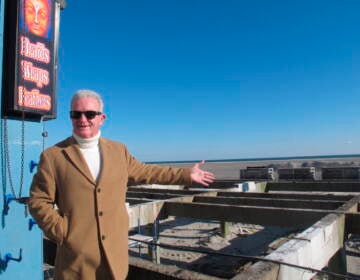$2.7M Grant to Cooper University Hospital could help ‘bend cost curve’ of medical treatment
Hopes are high at Cooper University Hospital that a $2.7 million grant from the Center for Medicare and Medicaid Innovation will help Camden to become the first city to “bend the cost curve” of medical treatment.
Though the grant was officially awarded to Cooper, the funds will be used to support the work of the non-profit Camden Coalition of Healthcare Professionals (CCHP).
Dr. Jeffrey Brenner, director of Cooper University’s Institute of Urban Health says the CCHP has been working for 10 years to understand how the healthcare system can provide “better care at a lower cost.”
His hopes are high the grant will help alleviate the burden of a small group of patients hospital officials say account for 30 percent of healthcare costs for Camden residents. Brenner calls this group “superutilizers” or people who frequently visit the hospital. He says one person went 113 times in a single year and another 324 times in five years.
Most superutilizers have complicated social and mental issues, multiple illnesses and are poverty stricken, he explained.
Identifying problem areas
One “incredible accomplishment” of CCHP has been their compilation of the billing data of Camden residents who visited any of the city’s three emergency rooms, Brenner said. This massive statistical resource enabled the non-profit to identify problem areas and design programs to address them.
To reduce the cost of superutilizers care, Brenner said the system needs to “blow up the current [healthcare] model” which is a “passive model with no accountability.”
CCHP’s solution was to create an outreach team to respond to the first ever real time stream of health information data from the city’s emergency rooms — a revolutionary system designed by CCHP. The outreach team will meet patients with multiple admissions in the past six months at their bedsides to offer their services as care management coordinators. They help plan discharges, sort medications, and talk to attending doctors and nurses. The outreach team continues to advocate for the patient for anywhere from two to nine months, making sure that important health information is communicated by accompanying the patient to follow up appointments and through home visits.
The process is intended to be a “warm hand off” of the patient from the hospital’s care to the primary doctor’s care, Brenner said. These patients need different care than the typical “one size fits all” approach of many primary care offices. If a patient is supported through the care transition, the likelihood that they will return to the hospital for treatment is diminished because important health information is communicated accurately to the patient and his or her doctors.
Improving care management
The Innovation grant will help CCHP “beef up care management,” Brenner said. Adding $920,000 every year for the next three years to the $3.5 million operation will allow them to “double their entire interventions.” The non-profit currently has only one outreach team that can “touch 100-150 patients a month.” With the grant funding, CCHP is already in the process of hiring another team so they will be able to reach twice as many people.
Brenner believes they received the grant because there aren’t many organizations who are doing everything under one roof, like the coalition is.
“We’re just trying to figure out how to bend the cost curve without destroying the system by providing better care for sick people through collaborative, data driven, hands on practices,” said Brenner. “We don’t want to hang on to these patients forever. We just want to help primary care offices catch these people.”
CCHP’s reach already extends beyond Camden. Similar programs are in place in Trenton and Newark. Rutgers University’s Center for State Health Policy also received a sister grant of $14.7 million to replicate the coalition’s programs in Aurora, Co., Kansas City, Mo., Allentown, Pa., and San Diego, Ca. Brenner said the coalition will receive a portion of the Rutgers grant for training and technical assistance.
WHYY is your source for fact-based, in-depth journalism and information. As a nonprofit organization, we rely on financial support from readers like you. Please give today.




